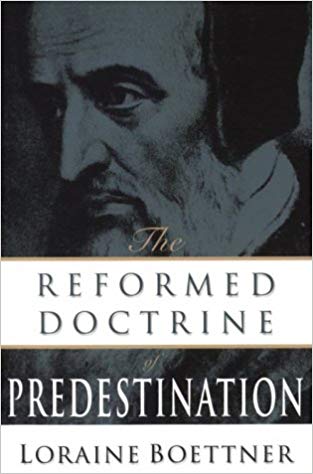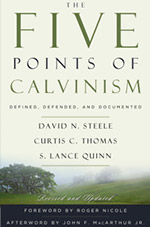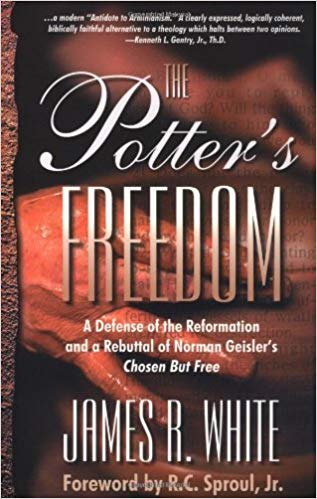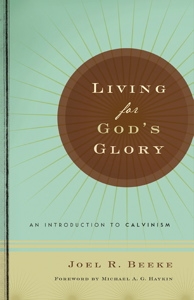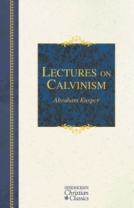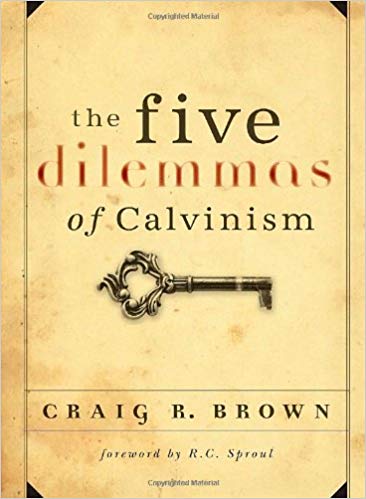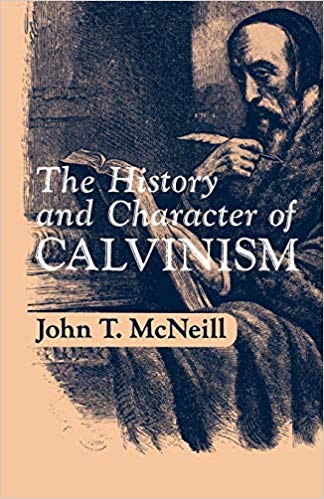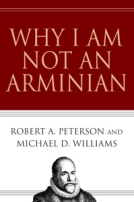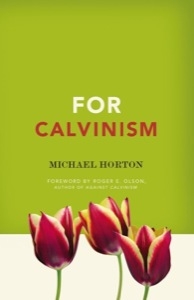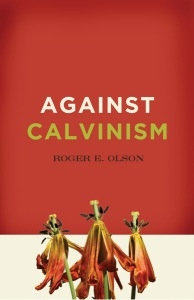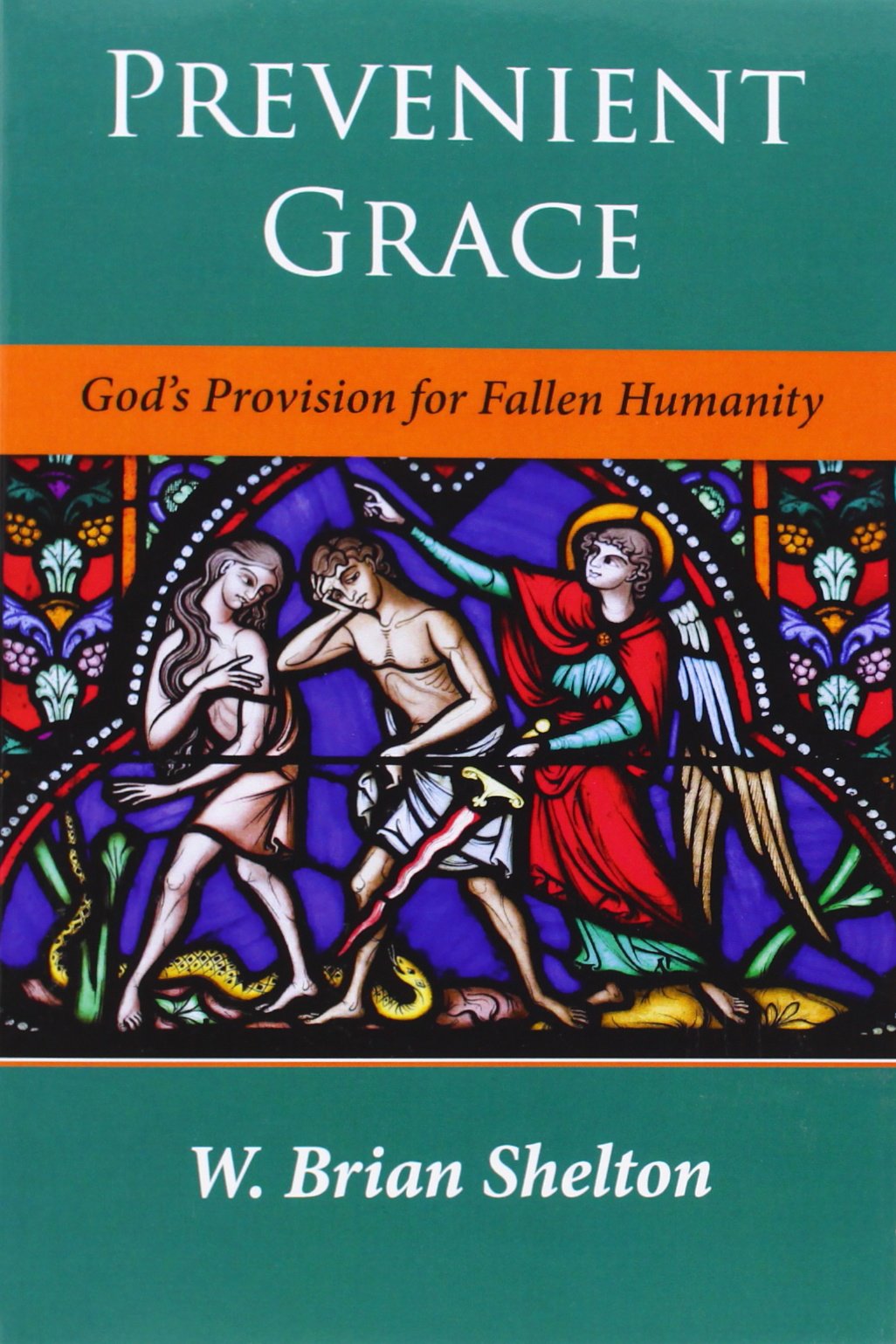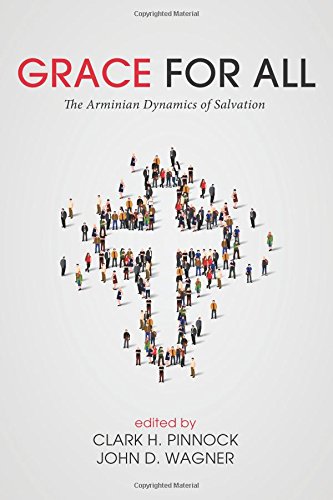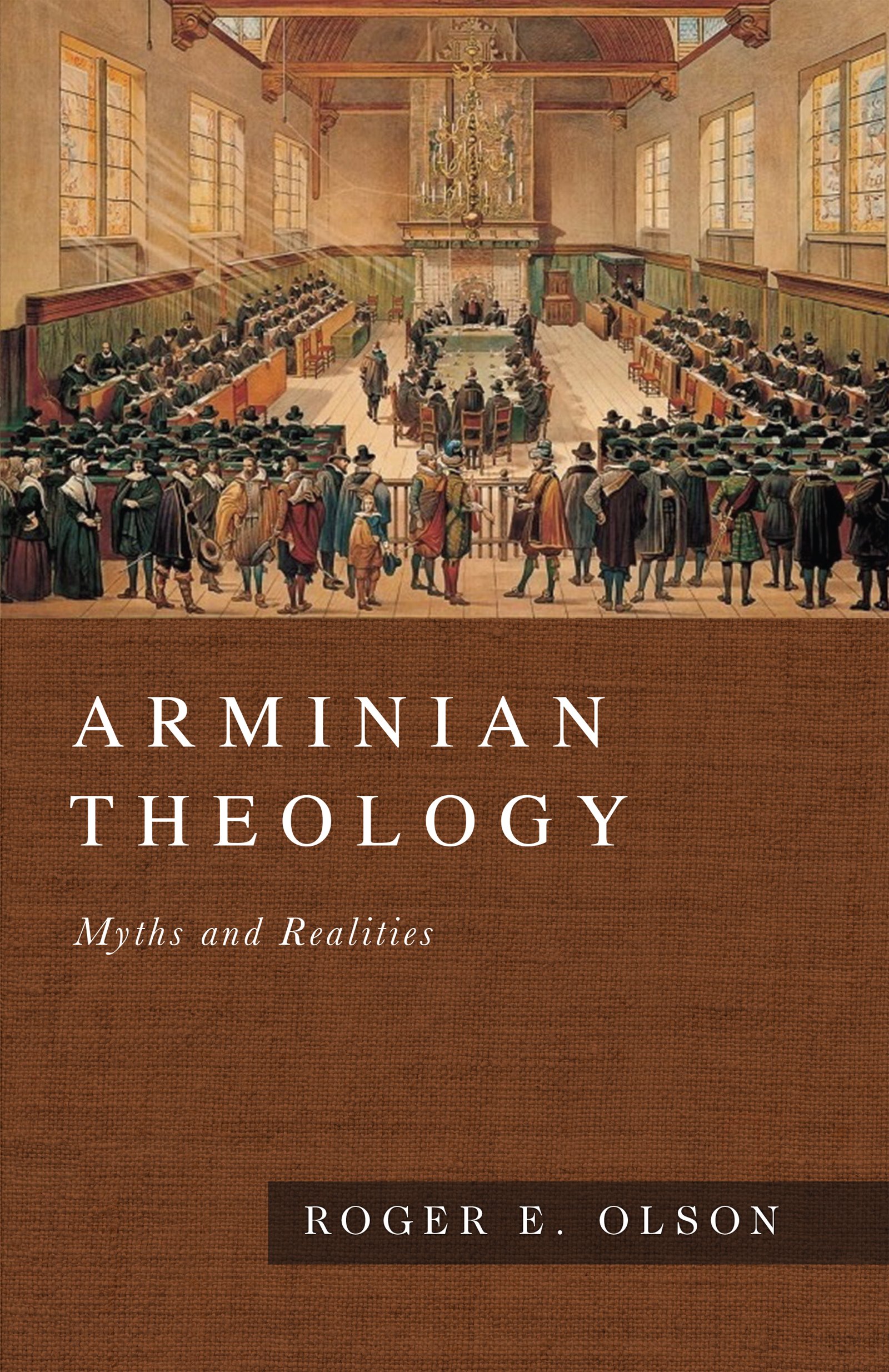I have been a Calvinist for fifteen years or so. I have relished our doctrines and, as a Presbyterian, cherished our ecclesiology. And like all my Calvinistic brothers, I have had my bouts with Arminians. From these encounters, we have formed certain opinions about Arminianism. Some of us have even read Arminian theological works. However, I have found that most of my dear brothers have formed their opinions about Arminianism second hand. This is not to say that the opinions are incorrect but very few books handle them directly. What I wish to do in this essay is to ‘expose’ Arminianism and expose it to my Calvinistic brethren.
Several years ago, I began to ‘collect’ Arminian theological works. I wanted to read them for myself. I found myself constructing arguments against Arminianism without really being able to cite them. But after several years of hunting them down (the books, that is), I think I ended up actually possessing more Arminian theological text books than the Westminster Theological Seminary library. From those years of dabbling in and out of their works, I found that half has not been told. I suspect you too will discover these findings to be quite surprising.
We are accustomed to fighting Arminianism on two major fronts. One is in the area of predestination and the other is over the issue of ‘free-will.’ Both have been ably addressed by Reformed writers and scholars. As is well known, those are the critical and principial positions undergirding Arminianism. So I will not traverse those grounds again.
In my research, I was set at ease and actually elated to find that their own writers felt that consistency was critical to their system. They relish their doctrines as much as we ours. One of their highly respected Methodist theologians, John Miley, rightly perceived that all our (i.e. Calvinistic) doctrines hung together.1 They sought a different ground for atonement, a different doctrine of justification and a different formulation of the decrees of God. They yearn to be as consistent and systematic as we. Their system hangs together as well as our own (in many of their works). As one would expect, because the principial issues (God’s sovereignty and the bondage of the will) have been precluded at the outset, the reverberations from these concessions crop up throughout their theology. One such doctrine that suffers from this is the doctrine of justification by faith. It has been grossly overlooked by Calvinists in their polemic against Arminianism.2 In one sense, it is as important as the doctrine of sovereignty and I suspect even more important. Their view of the doctrine of justification, so easily overlooked and misunderstood by evangelicals at large (hence the ECT escapade), is frighteningly non-protestant. But I am getting ahead of myself. Suffice it to say, justification by faith is not the only doctrine that suffered, as we shall see.
What I wish to do in this brief survey is to expose some of the major tenets of Arminianism. In order to do this, I will interact with their primary sources. All the authors I cite are decidedly Arminian; it is not my label slapped onto them. They wear it as a badge of honor. But in the end, it will be seen that their system is crassly Pelagian and their position should startle the sensibilities of all true evangelicals. However, the primary audience I have in mind are Calvinists who wish to read it for themselves. Some of these doctrines will receive a more thorough analysis in the near future.3 This is merely a survey of their positions. I must also convey a word of caution or rather perhaps, an apology of a sort. The tone of this survey is not sympathetic, not in the least. I have grown quite impatient with their perspective because it seems to be gaining some power among evangelicals. It is my hope that the following survey will give ample impetus to further study and information to all readers. I am fast coming to the conclusion that Arminianism may not be evangelical at all. However, I will reserve that judgment and be charitable at this moment. I would appreciate any and all corrections to this survey. If I have incorrectly cited someone or have misrepresented a position, then please inform me. I will stand corrected.
Arminianism
‘It is hard to find a Calvinist theologian willing to defend Reformed theology, including the views of both Calvin and Luther, in all its rigorous particulars now that Gordon Clark is no longer with us and John Gerstner is retired. Few have the stomach to tolerate Calvinian theology in its logical purity. The laity seem to gravitate happily to Arminians like C. S. Lewis for their intellectual understanding. So I do not think I stand alone. The drift away from theological determinism is definitely on.’4 So spoke the Arminian. Perhaps he is absolutely correct. But is this good? Let us see at what cost.
Doctrine of God’s Knowledge
Arminians detest the doctrine of predestination as presented by Calvinists. Since the word itself is Biblical, Arminians are forced to define the term in a manner consonant with their assumptions. In order to do that, they must recast the traditional doctrines related to God’s knowledge. Most of us have no problem saying that God knows all things; but this has vexed most Arminians. Many evangelical thinkers are promoting what is called ‘free will theism’ or ‘the openness of God’ theism. Such is the direct result of Arminian theology pushed to its logical tendencies.5 Gregory Boyd, who himself is an Arminian, has argued that ‘Arminian theologians have not generally followed through the logic of their insight into the nature of creaturely freedom to its logical (and biblical) conclusions.’6 Their view is astounding.
They, the Arminians who are Freewill Theists, are not willing to concede that God knows all things, at least not in the traditional sense. For example, Clark Pinnock argues that ‘omniscience need not mean exhaustive foreknowledge of all future events. if that were its meaning, the future would be fixed and determined, as is the past.’7 For them, the idea of foreknowledge ‘requires only that we define the scope of foreknowledge with care. In some respects the future is knowable, in others it is not. God knows a great deal about what will happen. He knows everything that will ever happen as the direct result of factors that already exist. He knows infallibly the content of his own future actions, to the extent that they are not related to human choices… All that God does not know is the content of future free decisions, and this is because decisions are not there to know until they occur.’8 The problem with Rice’s seemingly harmless formulation is that the whole future, as envisioned by this explanation, is filled with nothing but numerous human decisions. In order for God to know even two seconds into the future, God must know the decisions of the first second which He is not permitted to know (or, as they argue, He chose not to know). If He does not know it, then how can He know His own future actions when they are dependent upon the free acts of man? Thus God in fact does not know the future at all because He does not know our decisions nor His responses to them. Rice is even more adamant in another book: ‘Not even God knows the future in all its details. Some parts remain indefinite until they actually occur, and so they can’t be known in advance.’9 This sort of formulation is gaining ground among some evangelicals.
This would quite naturally lead to the notion of ‘divine learning.’ Namely, God must learn as the future unfolds. May it never be said that He infallibly knows all things. In fact, without much shame, they virtually concede in some measure that God is surprised. ‘God is not startled and is never struck dumb as the future unfolds, but an element of surprise embraces the divine knowledge just as it does ours even when we think our predictive powers are at their height. Were you a god, would you not find it dull to fix the future irrevocably from eternity?’10 That last question typifies and exposes their theological tendency, namely, God created in the image of man. In response, I ask, ‘What does it matter if I should be bored? How does my own boredom determine the nature of God’s knowledge? And in what real sense do we have any predictive powers? Isn’t God’s predictive power the sheer evidence of His majestic divinity?’ Yet Rice’s assumption admits this central thesis: God is merely a superhuman being.
John Sanders’s thesis is more subtle but also just as destructive. He argues that the nature of the relationship necessitates risks and therefore God’s providence is a risk of a sort. He states that God is ‘amazingly creative’ and enters into a risk relationship with human beings. ‘In the God-human relationship God sometimes decides alone what will happen; at other times God modifies his plans in order to accommodate the choices, actions and desires of his creatures.’11 God, in effect, reacts to our decisions and actions. But that is Sanders’s point, God takes risks. He further explains that when God created the world, He had a ‘great chance of success and little possibility of failure while concomitantly having a … high amount of risk in the sense that it matters deeply to God how things go.’12 He says that sin was possible, but not plausible because God took a risk. Sanders is aware that our sensibilities would be ‘shocked’ with this sort of formulation. But a God of risk taking (unaware of what the future infallibly holds) is for Sanders the most relational picture of God. In essence, his view could be summed up by these words: ‘But God sovereignly decides not to control each and every event, and some things go contrary to what God intends and may not turn out completely as God desires. Hence, God takes risks in creating this sort of world.’13 Let us be frank, God is a big God and He can take all these mishaps; the risk is something He is big enough to take.14 But what about that maverick atom that might destroy my health, is He actively involved? I hope so; no, I know so, the Bible tells me so.15
For the Arminians, the fundamental belief in man’s freedom must be retained at all cost. Omniscience is denied (and thus the doctrine of Middle Knowledge is readily held by many so as to take omniscience seriously).16 This denial of omniscience is not held by all Arminians. Samuel Wakefield almost sounds like a Calvinist in his defense of God’s omniscience, and he is well acquainted with the philosophical ‘problems’ associated with the notion of necessary future contingent acts of human beings.17 So within their own camp, they see that one cannot concede God’s omniscience. Most Arminians cannot accept the balance maintained in Scripture, namely, God knows all things and is in control of everything while man is justly responsible for all his actions. They maintain that it must be ‘reasonable’ and rational. Sanders argues that it must be reasonable at all costs.18 Calvinists maintain that it must be biblical at all times; our reason bows before revelation, credo ut intelligam.
Doctrine of Atonement
Another formulation that might also surprise many is the Arminian view of atonement. Most Christians believe that Christ paid the penalty for our sins and that Christ is our substitute. In this substitution, penal dimensions of divine transaction had transpired. This formulation has forced Arminians to redefine, once again, the doctrine of atonement. They rightly believe that the substitutionary doctrine necessarily entails limited atonement. So the first alteration in their position is the common biblical view of Christ paying the penalty for the sins of sinners. The following is an important observation from an avowed Arminian.
A spillover from Calvinism into Arminianism has occurred in recent decades. Thus many Arminians whose theology is not very precise say that Christ paid the penalty for our sins. Yet such a view is foreign to Arminianism, which teaches instead that Christ suffered for us. Arminians teach what Christ did he did for every person; therefore what he did could not have been to pay the penalty, since no one would then ever go into eternal perdition…They also feel that God the Father would not be forgiving us at all if his justice was satisfied by the real thing that justice needs: punishment. They understand that there can be only punishment or forgiveness, not both—realizing, e.g., that a child is either punished or forgiven, not forgiven after the punishment has been meted out.20
A century before, the Methodist theologian, John Miley, one of the most important nineteenth-century Arminian thinkers in America (along with Watson and Pope, who were British), also saw the inconsistency of the theories within Arminianism. He felt compelled to argue that the doctrine of strict substitutionary atonement hung together as a system only in Calvinism.
If other cardinal doctrines of Calvinism are true, its doctrine of atonement is true. It is an integral part of the system, and in full harmony with every other part of it. The doctrines of divine sovereignty and decrees, of unconditional election to salvation, of the effectual calling and final perseverance of the elect, and that their salvation is monergistically wrought as it is sovereignly decreed, require an atonement which in its very nature is and must be effectual in the salvation of all for whom it is made. Such an atonement the system has in the absolute substitution of Christ, both in precept and penalty, in behalf of the elect. He fulfills the righteousness which the law requires of them, and suffers the punishment which their sins deserve. By the nature of the substitution both must go to their account. Such a theory of atonement is in scientific accord with the whole system. And the truth of the system would carry with it the truth of the theory. It can admit no other theory. Nor can such an atonement be true if the system be false.21
As a result of this, there is debate among Arminians over the nature of atonement. Some believe that the governmental theory is the Arminian position. Wesley, on the other hand, seems to have adopted the penal substitutionary theory (albeit inconsistently).22 Most, however, did not. Richard Watson accepted the governmental theory of atonement as did the Methodist William Burt Pope. They knew that the doctrine of penal substitutionary atonement was inimical to their theology. William Pope for example argues: ‘Arminianism holds that the Sacrifice was offered for the whole world: it must therefore for that reason also renounce the commutative theory of exact and mutual compensation; since some may perish for whom Christ died, and He would be defrauded of His reward in them.’23 What he is saying is that we cannot argue that Christ really paid for the penalty of sin for everyone for whom He died, in the strictest and substitutionary sense. If we were to say He did, then we are (and his inference is correct at this point) forced to conclude some of Christ’s blood was shed in vain (or limited to the elect). Then how and for what reason did He die?
One writer, apparently feeling the tension, sought to answer this. Benjamin Field gives his own vague model: ‘Christ did not pay the sinner’s debt in the sense in which the objector understands that phrase. It is only in a loose sense that the death of Christ may be thus spoken of. He did a something [sic] in consideration of which it is now quite consistent with God’s character as a moral Governor…’24 How can one argue that Christ died for sin in ‘a loose sense?’ What ‘something’ did He accomplish? But since they already denied penal substitutionary atonement, they are left outside without a working model.25 Even the modern Arminian theologian J. Kenneth Grider denies it more forcefully. ‘Scripture never states that He was punished for us or that He paid the penalty for us. Scripture always states instead that he suffered for us.’26 But this is to deny the word ‘propitiation’ used in the NT, Rom. 3:24, 25; 1Jn. 2:2. Grider’s position is even denied by some of the elder Arminians who argued for the punishment doctrine along with their governmental theory (again, inconsistently).27 We believe this is not consistent on their part but commend them for their attempt to be faithful to the biblical language.
The more modern Arminians are unhappy with all the theories; they sense that the governmental theory does not fit well with Scripture (with the exception of Grider). R. Larry Shelton wants to adopt a different model; the model he proposes is even more vague and unbiblical.28 He argues, ‘Christ’s work was not just a moral example to inspire moral living, but a sacrifice of obedient worship in which we may participate vicariously through faith. Through this work, a grieved God whose faith in us has been compromised is enabled to believe in us again as He sees that we share in the grief for sin and righteous obedience that Christ expressed on our behalf.’29 Wow, now God can believe in us! This is nothing less than the old governmental theory filled with anthropocentric sappy sentimentalism.
As you can see, deny the substitutionary atonement and you are lost as to a working ‘model’ for atonement. Substitutionary atonement is biblical and is the only one that is in accordance with Scripture (for a thorough biblical defense of this, see the numerous works on atonement by Leon Morris). Being forced to recast the doctrine of atonement, Arminians have developed some of the strangest theories. Some, however, are aware of the difficulties of their position, and attempt to say something remotely similar to the biblical language.
Having seen their confusion, we now see what the aftermath of their universal atonement might mean. Again, the whole defense of universal atonement is an implicit admission of substitutionary atonement (we greatly differ as to its extent). Nonetheless, if indeed Christ died for everyone without exception and that He suffered for all their sins, then a different ground must exist for man’s damnation. This is simple and logical. If all their sins have been effectively dealt with on the cross, then on what basis will unbelievers perish? Donald Lake, out of sheer consistency with his fundamental belief, falls into this conclusion.
“More importantly since Christ has finished his work of redemption upon the cross, the ground of our salvation has completely shifted. What is it that condemns a man? Is it his sins, large or small, numerous or few, that condemns a man and sends him into a Christless eternity? The answer of the New Testament is an absolute “No!”…What condemns a man is not sins. Why? Because Christ’s redemptive and atoning work is complete and satisfying. Even man’s rejection cannot frustrate the purposes of God…the issue of every man’s salvation turns not upon his sins, but rather upon his relationship to the Son!…Sin may have made the cross necessary, but the cross has now made sin irrelevant as far as man’s relationship to God is concerned. This is, perhaps, a little too strong, but the fact is, that man’s problem now is not so much sin or sins, but his reaction to what God has done in Christ.30
If the above quote is true, then it also follows that one cannot really call anyone a ‘sinner’ because no sin can technically be imputed to them. However, unbelief is sin but didn’t Christ die for all sins? Alas, I quibble. Who am I to say that such inconsistency is laughable? Perhaps we should shudder instead.
Doctrine of Grace (Prevenient)
Evangelical Arminians, in some sense, took seriously the doctrine of Original Sin. They knew that the Fall thoroughly impaired man’s will. Since the Calvinistic system was the reigning system at the time and it alone gave adequate attention to the doctrine of Original Sin, Arminianism was forced to address the doctrine in a different way. While seeking to recognize the serious effects of Original Sin, they believed that Christ’s death nullified all the effects. They believed their doctrine of prevenient grace could both take Original Sin seriously while at the same time put everyone on an equal moral footing. In that sense, grace could be said to precede all acts of faith. John Wesley held to this position. The net effect of it was that God has given grace to everyone to be able to believe if they will. The best sort of definition comes from Kenneth Jones who says, ‘The prevenient grace of God’s convicting Spirit simply lifts the sinner up to the point where the choice is possible.’31
Mrs. Wynkoop, a Wesleyan scholar, goes so far as to say, ‘No man is found in the ‘state of nature.”32 If she is correct, then everyone is in some sense (incompletely) in a redeemed state. Whereas the Arminians took Original Sin seriously, they did, however, overcome the problem by simply cloaking it with their novel doctrine of prevenient grace.33 In other words, they are one with the Calvinists when it comes to the debilitating effects of the Fall. But due to this novel doctrine, they are one with the Pelagians in making everyone capable of believing. So they part company with the Calvinists by somehow [by fiat?] making the grave judicial effects of Original Sin no longer operative by their universal prevenient grace. The beauty of the Roman Catholic doctrine of Original sin is that it controlled the flow of grace to counter the grave effects through their sacraments. Though both are wrong, at least the Roman Catholics limited it to their church and that it was not universal. The Wesleyans, on the other hand, made everyone recipients of grace without exception. For the Roman Catholics, all those inside the church are without Original Sin. For the Wesleyans, all those in and outside the church are without Original Sin (generally speaking).34 Perhaps this last statement was too strong; nevertheless, some of the judicial aspects no longer apply and for sure, its effect has been greatly dampened. Both systems have a doctrine of grace that is far from affecting salvation.
Some have tried to give what appears to be a scriptural argument for their position. Grider submits various passages which argue for repentance and thus concludes that man has the gracious ability to repent. Since God calls man to repent and since God wouldn’t demand what we couldn’t do, therefore, there is prevenient grace. Impeccable logic! The minor premise, however, is at fault. Even if one granted that, the conclusion could not be drawn. There are other ways for accounting for the premise.
They do not wish to relegate the Holy Spirit; they believe He is active in and working with prevenient grace. Grider urges us to believe that the Holy Spirit must work in order that we would believe. The passages he cites hardly argue for universal prevenient grace; it certainly seems to argue for particular prevenient grace.
John Miley seems to avoid the phrase ‘prevenient grace’ but not its meaning. We will let him speak for himself:
Man is fallen and corrupt in his nature, and therein morally helpless; but man is also redeemed and the recipient of a helping grace in Christ whereby he is invested with capabilities for a moral probation. He has the power of meeting the terms of an actual salvation. All men have this power. It is none the less real or sufficient because of its gracious source. Salvation is thus the privilege of every man, whatever his religious dispensation.35
He makes several startling statements. He states that man has been ‘redeemed.’ In what sense? By making man capable or by investing him ‘with capabilities for a moral probation.’ [Now, where is that in Scripture?] But the other surprising comment is his argument for a probationary situation (similar to Adam?); it must be a probationary state because if it is denied, then (as they rightly conclude) one would have to fall into Calvinism.36
This probationary period invested all of humanity with great gifts from the atonement. Similar thoughts developed in the Twentieth Century. The Nazarene Orton Wiley states that the atonement gave the following general benefits:
- ‘The first benefit of the free gift was to preserve mankind from sinking below the possibility of redemption.’ But is there such a condition? When can our sin conquer sovereign grace? Most of all, where is that in Scripture?
- ‘The second effect of the free gift was the reversal of the condemnation and the bestowal of a title to eternal life.’ He argues that the ‘culpability … was removed by the free gift in Christ. The free gift removed the original condemnation…’ Again, a statement without proof. We have already seen that sin no longer is a real concern when is comes to our eternal estate.
- ‘The free gift was the restoration of the Holy Spirit to the race.’ What he means by this is not that all are regenerated by the Spirit but rather all are now given the Spirit ‘as a provisional discipline for the fuller grace of redemption.’ He is to everyone, ‘the spirit of awakening and conviction.’37
So what do we notice? We are in a probationary state. In this state, the Spirit works in all and prepares everyone for grace but the final choice is up to man. Or as the veritable Arminian Grider says (who was quoting another Arminian): ‘God voted for me, the devil voted against me, and I cast the deciding ballot for myself.’38 Man may kill grace (see section on Synergism). ‘The heathen have a measure of grace. The power to resist grace is of grace.’39 The reason this is so forcefully maintained is because the Spirit’s work has gushed out into everything and everyone. ‘The Divine Spirit is atmospheric, and it becomes personal whenever any person appropriates it. … The Divine Spirit is like the mother’s heart. It is universal and infinite. It is the mother-soul of the universe, with infinite power, and sweetness, and beauty, and glory [blah, blah]… and what time any man accepts the influence of the Divine Spirit, and cooperates with it, that moment the work is done by the stimulus of God acting with the practical energy and will of the human soul.’40 The Spirit is in everyone working to restrain the inherited bias and prompt us towards the good. In fact, they have a good idea when this work begins. Jones is quite sure that this work occurs in every child ‘as soon as [he] can understand anything.’42
This almost pantheistic notion of the Spirit-Grace obviously could be abused. Modern liberal Methodists did not miss this opportunity to exploit it. Some contemporary Methodists argue that since Wesley promoted this doctrine of prevenient grace, we can further conclude that those who never heard the Gospel could still respond to prevenient grace and thus be justified (apparently hinted at by Wesley). And to push this idea much further, they reasoned that ‘our evangelistic task is set, not in a world that is lost and deprived of God, but in one in which God is very much active, and where, moved by God’s grace, people already experience the love of God in good measure through Christ and the Holy Spirit [mind you, the author is speaking of the unregenerate who never heard the gospel]. The evangelistic task is not to deny this universal grace, but to help persons move from ‘grace to grace.”43 In other words, we are not bringing Good News to a world under the Wrath of God but we are bringing a decent message to a graceful people (certainly not graceless because of prevenient grace) who were already saturated by and soaked in grace.44 Similar conclusions had been drawn by another writer in our section on ‘The Doctrine of Atonement’ where ‘sins’ are no longer an issue for lost human beings.
So God has dispersed grace to everyone and everyone has been endowed with some grace, they are in an elevated status, a super-nature status (just short of redeemed nature). One can only wonder why anyone should pray for someone else’s salvation since it is ultimately up to the individual. God can’t do anymore, He already cast His vote for them, what is there left for Him to do? Thank God for sovereign mercy that can make a sinner willing in the day of His salvation.
Another point to consider is that if the atonement has secured the probationary status of everyone, then why hasn’t it saved everyone? In other words, did only a portion of Christ’s work merely apply to everyone and the rest is in limbo until accepted? They argue that prevenient grace was secured for everyone so that we could believe or reject the Gospel. They also argue that Christ died for everyone. How does only a portion of that work on the Cross apply to Everyone? ‘I did everything for you, everything and I am applying only 90% of it to you, but you have to believe for the other 10%.’
Their doctrine of prevenient grace is ultimately rooted in their insistence upon the absolute non-negotiable of their theology, namely, man must be free enough to accept or reject. They wish to be debtors to Free Will and we to Sovereign Grace. They argue that since prevenient grace came before our choice, therefore their theology is one of grace. But then again, this sort of argument was advanced by the Papists. It is true that this universal prevenient grace came before our choice; but it affected no one efficaciously. It led none to salvation. The efficacious act came from man who could accept or reject the prevenient grace. Man’s choice is the sine qua non of their theology and not God’s sovereign irresistable grace. We, on the other hand, declare, ‘Of Him are ye in Christ Jesus!’
Doctrine of Justification
It has been recognized by some Reformed writers that Arminians deny the imputation of the active righteousness of Christ. The usual personality that is appealed to from the Reformed camp is Piscator.45 The Arminians who adhere to this position hold to it for different reasons (namely, their preoccupation with sanctification).
John Wesley did not consistently communicate where he stood on this issue. Early on he denied it, but after James Hervey attacked him, Wesley seems to have reaffirmed it though some suspect that he fell back into his earlier position.46 Wesley’s response to James Hervey’s Theron and Aspasio argues that Hervey’s doctrine of imputation of Christ’s righteousness will produce antinomianism. The gift of righteousness for Wesley was ‘the righteousness or holiness which God gives to, and works in them.’47 This phrase and similar ones like it became the hallmark of Arminianism. Even one of Wesley’s close friends, William Grimshaw, disagreed with Wesley on this (though amicably).48 For Grimshaw, this doctrine was the doctrine used of God to deliver him from legalism. One wonders if charity blinded him at this point; he was aware of Wesley’s view and yet worked with him nonetheless.
It is not imputation but impartation of righteousness that was important to them. This is very reminiscent of the debate between Protestantism and Roman Catholicism; the debate was over imputed and infused righteousness. We will see that a similar line of reasoning exists within Arminianism.
The popular Arminian Bible commentator states what the Arminian view of justification is: ‘To say that Christ’s personal righteousness is imputed to every true believer, is not scriptural: To say that he has fulfilled all righteousness for us, in our stead, if by this is meant his fulfilment of all moral duties, is neither scriptural nor true… In no part of the Book of God is Christ’s righteousness ever said to be imputed to us for our justification.’49 For Clarke, the passive work alone is applied to believers, namely, Christ’s death has procured our forgiveness. The active imputed righteousness of Christ, he argued as his forefathers, produces antinomianism.50 Similarly, John Fletcher’s massive work is essentially a diatribe against the active righteousness of Christ.51 The learned and influential Richard Watson argued that imputation of Christ’s righteousness ‘as to be accounted as our own, [has] no warrant in the Word of God.’52 Their lady theologian (not official, I hope?) states, ‘Christ’s death is a substitute for our punishment but not for our holiness.’53 This is a curious statement because most Arminians, we have seen, have argued that Christ was not a substitute for our punishment.
Even the most recent twentieth-century Wesleyan theologian argues the same. ‘We Arminians understand that God as Judge, when He forgives us, really does make us righteous by imparting righteousness to us, and we feel [my emphasis] that many passages of Scripture support this understanding.’ Justification, for him, means to ‘make you righteous’ and not ‘declare you righteous.’ He says that he believes in imputation of righteousness but also in imparted righteousness, the emphasis being on the imparted.54 His systematic theology gives only one and a half pages to the doctrine of Justification and the bulk of the argument is a prolemic against imputed righteousness. The texts he adduces (three to be exact, though only two have any bearing) only argue that we will live in righteousness (Rom. 8:4 and 5:1); that is not something any Protestant has denied. All Reformed thinkers argue that we will fulfill righteousness; however, that righteousness does not justify. Kenneth Jones follows Grider at this point. However, he does not give the doctrine any separate treatment (not even a section in a chapter). After the chapter on Christ, he launches into a chapter on salvation which gives half a page to the word justify as one of the many ways of viewing salvation. His definition: ‘This is both the declaration that one is no longer guilty, and also the making of one to be righteous… Does God merely impute righteousness to the sinner, or does he impart righteousness to him? … If this were the only word for salvation it would be difficult to understand, but it is only one of the models for what God does in and for us. No one word can express it all.’55 It is mind boggling to read this. Confusion over the biblical word and then thoughtlessly declare ambiguity. Was not the Reformation sprung into life over this word? Is not our whole salvation determined by our standing before God? Is there not a world of difference between what is done in us versus what is done for us?
They feared that the historic doctrine undercut moral responsibility, and so they charged the Calvinists of being antinomians. They argued that the atonement put one on an equal footing with Adam.56 Once this atonement was accepted by faith, all sins were forgiven and we were then imparted righteousness which by grace will lead us to holiness. The question then becomes, by what righteousness is a person justified? Is it soley the imputed righteousness of Christ? No. Then, is it by this mixed righteousness in a person (the imparted righteousness mixed with our obedience)? That seems to be the conclusion one must draw.57
Though there appear to be some statements regarding the imputation of Christ’s righteousness in justification, those are effectively nullified by their emphasis on impartation. Samuel Wakefield shows where there is verbal similarity between Arminian writers and Calvin himself. Nonetheless, imputation of Christ’s righteousness to believers is denied by the Arminians, as observed by Wakefield.58 Whereas J. G. Machen died thanking God for the active obedience of Christ, Wesleyans and Methodists, on the other hand, repudiate this doctrine. Did Machen die outside of true saving faith?
Forgiveness equals Justification
The upshot of this position is more troubling (and also quite confusing). For them, no one’s righteousness really saves; sin is pardoned and no imputed righteousness is accredited. It appears, the essence of justification is forgiveness.59 This seems to be Wesley’s position. Methodists like Tillett do not like to leave it as mere forgiveness. Curtis believes that forgiveness and pardon are not terms ‘quite large enough to express all the apostle means by justification.’60 Yet many, like Wesley, would want to limit it to that. Miley, astute as he is, argues that a forensic view of justification would make forgiveness superfluous and therefore argues that justification is not forensic in the truest sense but simply forgiveness. Forgiveness is the ‘vital fact of justification.’ But there is a slight forensic dimension, namely, ‘the result of forgiveness is a justified state.’61 Field, in his catechetical manner asks, ‘How is it proved that justification is substantially the same blessing as pardon?’ Then he cites various passages to argue the case. This is a question that assumes too much and a question that should have never been asked by a Protestant. One must not miss the point here. They insist upon this definition to avoid both the penal and forensic demands of justification and atonement. It is not simply a matter of emphasis. If justification is strictly forensic, then the declaration must be in truth, namely, imputed righteousness (of Christ). But this is the very element that is denied. To declare someone righteous assumes imputation. To preclude such a demand, they argue that it must be merely forgiveness. Now, not everyone is insistent here but enough state it to bring it to our attention. Most of them, however, are inconsistent.
Denial of Imputation
The second aspect is the strict denial of any real imputation. Hills states that ‘there can be no such thing as a transfer, or imputation, either of guilt or of righteousness.’62 This is related to their doctrine of Atonement which lacks the penal dimension (though they are not all in agreement on this). Pope argument is similar to Hills’s. There is no imputation of our sins to Christ nor his righteousness to us.63 Clarke explains why there is no imputation of Christ’s active righteousness. ‘The truth is, the moral law was broken, and did not now require obedience; it required this before it was broken; but, after it was broken, it required death.’64 Christ’s obedience pertained only to Himself (as a private person). ‘His active obedience has nothing more to do in the work of redemption than his supreme Divinity. Both were essential to his character as the world’s Redeemer; but neither of them can in truth be imputed to us.’65 His capacity as the Redeemer only came into play at his death. Christ’s righteousness, therefore, is not our righteousness. Even Adam’s sin is not imputed to us because imputation has been precluded.66
The Role of Faith
The third aspect and the most confusing is their view of the role of faith in this odd formulation of justification. As briefly mentioned above, there is still some talk of ‘imputation.’ For them, faith is imputed for righteousness. Though merit is explicitly denied (in word), it is maintained in their theological definitions. They maintain that our righteousness does not save but neither does Christ’s. The person who believes is declared righteous and is no longer guilty, but his sins are forgiven. ‘The imputation of righteousness is, then, the non-punishment or pardon of sin… it will also be seen that by the imputing of faith for righteousness, the apostle means precisely the same thing.’67 Again, the emphasis is on forgiveness but they also suggest that faith itself is imputed as righteousness. In some of their statements, this suggestion is more pronounced. While at one time they make faith itself the righteousness, they at the same time assure us that righteousness comes by faith. I thought this confusion was simply my own but to my surprise, I noticed that Girardeau himself observed it [in his explanation of the Arminian view which he ably refutes]: ‘That is, the righteousness of God is the righteousness of faith, and the righteousness of faith is the righteousness which is by faith. This is not Paul’s confusion; it is Dr. Ralston’s. He seemed unconscious that a righteousness which inheres in faith and a righteousness which comes by faith are not, cannot be, the same thing.’68 John Miley is clearer (and bolder, without shame) in saying that ‘faith itself, and not its object, that is thus imputed.… Hence any attempt at a metonymical interpretation of faith, so that it shall mean, not itself but its object, that is Chist, and hence mean the imputation of his personal righteousness, is utterly vain.’69 He later explains in what sense this faith is imputed as righteous and it is what is stated above, namely, one is forgiven (a full circle without defining anything). How is faith imputed as righteous? What is in faith? If the object is not Christ but ‘itself’ then do we have a faith in faith that justifies?
From what I can gather, so far, they don’t want to completely sever some sort of righteousness imputed to us. It is the nature of that righteousness that is vague and undefined. All we can know for certain is that justification means one is forgiven and yet is declared righteous, but it is not our righteousness (though some seem to hint that it is), nor is it Christ’s (which they all deny) nor is it faith itself (some say otherwise) but in another sense it is all of those points except Christ’s righteousness (which is the only thing that is explicitly clear).
The confusion here is serious. They know the significance of this doctrine and do not wish be Roman Catholics but they are also not satisfied with the historic doctrine and formulation. This serious confusion, no doubt, has produced grave pastoral problems and theological anxiety.
Some Serious Considerations
- Imparted righteousness: such a teaching is unbiblical and not protestant or evangelical. It is nothing less than the Romish notion of infused righteousness. This is not mere name calling. Some of their writers concede. Thomas Oden does not deny that the similarities exist. Wesleyans (along with others), he believes, ‘moderated’ the extremes between Wittenberg and Rome. He believes that this moderation is a ‘via media.’70 This is dangerous. He believes imparted righteousness needs to be underscored; there is too much ‘dialectic’ between imputation and impartation.71 We must never let the two meet; imputed righteousness alone justifies; imparted righteousness does not play any role in our justification. There can be no moderation. The antithesis between imparted/infused and imputed righteousness must always exist. If they continue to maintain this position, then they seriously err. It is Roman Catholicism in Protestant garb.
- Faith: they maintain that justification is by faith but do not clearly indicate how justification is anything different from forgiveness. Most of them (not all) seem to give some merit to faith itself.72
- Most of the modern works give little or no attention to the doctrine of justification by faith and are preoccupied with entire sanctification. Even in the two volume work A Contemporary Wesleyan Theology, one cannot find a separate chapter given to justification; in fact, if my reading is accurate, I don’t think they give it any special attention (Curtis gave almost three pages (actually two whole pages) to the doctrine in his The Christian Faith, 361-3).73 A contemporary reflection without a thorough commentary on the doctrine of justification is a sad testimony of their real belief. A whole chapter is given to their ‘entire sanctification.’ It would not be overstating the respective positions when I say that Reformed Christians lean on Justification whereas the Arminians lean on Sanctification. We trust in an alien righteousness whereas they seem to trust in inherent righteousness.
- An academic note: it appears that modern Arminian scholars are not unaware of the tension and problem here. One recent article argued that these two strands (evangelicalism which focuses on justification by faith, extra nos and moralism which focuses on imparted righteousness, intra nos) have existed in Arminianism. The evangelical John Hicks (not the liberal one) argues that the two strands ought not to be confused (Grotius/Limborch & Remonstrantism vs. Arminius & Wesley). His reasoning is penetrating and would to God many Arminians would come to this same conclusion.
The distinction between Arminianism and Remonstrantism is, more importantly, theologically significant. It is a watershed issue for evangelicalism. It is the watershed issue of the Reformation itself. If Arminianism is to remain evangelical, it must take seriously the importance of its doctrine of atonement and justification. From where does justifying righteousness come — extra nos or intra nos? Is righteousness a gift wholly external to ourselves, or is it somehow inherent within the act of faith?
The righteousness which is imputed, according to Arminianism, is the righteousness which Christ merited through his obedience. The righteousness which is imputed, according to Remonstrantism, is God’s gracious estimation of the human act of faith. This is no mere semantical difference. It is a fundamental disagreement concerning the ground of grace itself. It is the difference between being clothed in Christ’s perfect righteousness and being clothed in our own partial righteousness voluntaristically (i.e., ‘graciously’ in Limborch’s terminology, but not true righteousness according to divine justice) imputed to us. it is the difference between righteousness being wholly derived from Christ’s work or righteousness partially derived from our own faith.74
Hicks fully understands the issue. However, his distinction within Wesley is not that obvious; more of Remonstrantism is present in Wesley than Hicks would be willing to concede. But his observation is encouraging. Perhaps our Arminian brothers are rethinking this and may truly become more evangelical?
Quite admirably, Pope recognized the unique shifts and developments within Arminianism.75 He seems to have veered away from the Limoborchian tendency. This is not always the case among all Arminians. Hicks believes that the two tendencies are ‘logically incompatible’ and suggests that the two schools of thought are historically disconnected.76
Doctrine of Sanctification & Perfection
Wesleyans view their teaching on sanctification and perfection as their contribution to historic theology.77 I submit that this aberration is the inevitable fruit of their denial of the biblical doctrine of justification (the imputation of Christ’s rightousness). Wynkoop is correct when she states, ‘The true antithesis of Calvinism is the Wesleyan and (we believe) biblical concept of sanctification with its dynamic, life-involving meaning. Wesleyanism, unencumbered with the philosophy underlying Calvinism, finds the doctrine of sanctification not only biblical and practical but absolutely essential to salvation.’78
One can say, after having surveyed their literature, that more attention has been given to this one doctrine than any other doctrine in the Wesleyan corpus. They are known as the ‘holiness’ denomination.79 But, we shall see, it is no real holiness. A weed by any other name is… well, let me first prove my case.80
Perfection Defined
They consider perfection to be a second work of grace. And this work ‘is the work of the Holy Spirit — the act of God’s grace in the heart of one already regenerated, by which the ‘old man is crucified,’ and the moral nature is ‘cleansed from all unrighteousness,’ — unrightness, proneness to sin, sinful propensity.’81 So it is a second work of grace which is nothing short of the eradication of all sin. Yet the Evangelical and Calvinist William Grimshaw, a friend and contemporary of the Wesleys adamantly opposed the use of the phrase ‘erradication of sin’ though he worked closely with the Methodists of that time and was warmly loved and received by the Wesleys.82 Nevertheless, the Wesleys persisted. Adam Clarke believes that we can destroy sin ‘root and branch.’83
Wiley summarizes Fletcher’s view of Christian Perfection with approval:
Christian perfection is a spiritual constellation, made up of these gracious stars: perfect repentance, perfect faith, perfect humility, perfect meekness, perfect self-denial, perfect resignation, perfect hope, perfect charity for our visible enemies, as well as our earthly relations; and, above all, perfect love for our invisble God, through the explicit knowledge of our Mediator, Jesus Christ.84
I wish to God I had just one portion of that. But enough of me (since I’m not perfect), let us go on. Wiley, a Nazarene, argues that ‘Christian perfection …is nothing more and nothing less, than a heart emptied of all sin and filled with pure love to God and man. As such, it is a state, not only attainable in this life, but is the normal experience of all those who live in the fullness of the new covenant.’85 Its nothing more and nothing less!
At times, they call it ‘the complete destruction of sin’ or ‘perfect love’ or ‘entire sanctification.’ We can have it in this world. One theologian, William Pope, amazed me when he stated, ‘There is only one redemption which is reserved for His second coming: the redemption of our body. …There is no hint given in the Scriptural history of redemption that the finished triumph of the Deliverer from sin is never to be known in this world.’86 Glorification is virtually receiving a glorified body and nothing more because we can be perfect in this world. In other words, we are only awaiting the glorification of our bodies. ‘An unbroken, perfect, uninterrupted concecration of all the faculties on God is possible in itself, and it is possible on earth.’87 The fundamental proof for them is, if God calls us to it, we can do it. The logic is simple: ‘If through grace, we forsake one sin, we may forsake all sin. If we may be cleansed from one sin, we may be cleansed from all sin. If we may keep one commandment, we may, through grace, ‘keep the whole law’…’88 Of course, everything depends on the definition of ‘keep’ or ‘obey.’ We do not agree with his premise which teaches that we actually do keep any of the commandments in its full comprehesive sense. To minimize His demand is to play games with definitions.
At the same time, it needs to be understood that this perfection is not legal but evangelical, namely, it is the fruit of cooperating grace.89 It is so robust and pure that it can ‘endure the scrutiny of the Searcher of hearts.’90 Yet some argue that it is not absolute perfection.91 Clarke, however, says otherwise: ‘Be so purified and refined in your souls, by the indwelling Spirit, that even the light of God, shining into your hearts, shall not be able to discover a fault that the love of God has not purged away.’92 This earthly perfection can endure God’s omniscient holy scrutiny. Again, they argue that this is a work of God’s grace and not a product of human achievement. Clarke further says, ‘so he that says the blood of Christ either cannot or will not cleanse us from all sin in this life, gives also the lie to his Maker.’93 So, Calvinists, Lutherans and even the Roman Catholics are calling God a liar. He confuses the verses which speak of legal (forensic) work. There is a ‘definitive sanctification’ namely, a fundamental and categorical break from sin but not the total eradication of sin (which happens in glorification).
Inner Conflict and Indwelling Sin
For them, there is no inner conflict, no civil war. ‘In Christian perfection, there is no such fight with the disposition, ‘no civil war at all,’ for the wrong impulse never enters the consciousness as motive.’94 This distinction is critical. Love to God is so pervasive, the weaker impulse to sin is no longer a part of the conscious motive. He has a ‘potent attitude’ against it. This is the conclusion drawn by Curtis reflecting on Wesley’s thought. So, perfection is simply a conscious love toward God and holiness and a hatred of some of the inappropriate desires within (or ‘intolerance toward the disposition’).95 Calvinists have always said that this is our goal, but precisely because that sinful disposition inheres (whether we are conscious of it or not), we are still sinful. The Methodists may not be aware of these dispositions but we are; closing our eyes to them or being ignorant of them does not change the reality. For the Arminians, that which is predominant gets the label. Those who are driven more by perfect love are considered perfect or conceived of having achieved entire sanctification, whereas those who haven’t are simply born again Christians. If the believer has achieved this state, then he should declare it to the glory of God.96
Perfection Qualified
Of course, this notion of perfection needs to be qualified (to death?). It is not the absolute same holiness God requires but such holiness that can be achieved here (whatever that might mean).97 ‘Christian perfection is relative and probationary, and therefore in a certain perhaps undefinable sense limited.’98 It may be lost or even ‘utterly lost’; it is a perfection in imperfection (‘perfect in their imperfection’).99 However, unlike Pope and Clarke, Miley says that it is insignificant in comparison to God’s holiness.100 It is usually found in established Christians, and their aversion to holiness has been removed.101 It admits of degrees.102 It is a relative holiness.103 We can also still be tempted.104 But all known conscious sin can be eradicated. It is a perfection that is full of infirmities which are ‘involuntary transgressions of the divine law, known or unknown, which are the result of ignorance or weakness on the part of fallen man.’105 At this rate, this is simply a perfection that is nothing more than the lowering of Divine standards.
The Lord’s Prayer: Forgive us our Trespasses
Many have countered their claims by appealing to the Lord’s Prayer as a statement against the possibility of perfection in this world. Benjamin Field addresses the petition in the Lord’s Prayer where we are taught to pray, ‘forgive us our trespasses.’ To this he says, ‘it should not be forgotten that, though we do not sin according to the evangelical sense of that term, but fulfil the law by pure love to God and man (Rom. xiii. 10), there are many involuntary improprieties of speech and behaviour into which we may be drawn through ignorance, mistake, or infirmity. These may be regarded as ‘trespasses,’ though not charged upon the conscience and imputed as sin; and of them we should ask the forgiveness of our Father in heaven.’106 Hmmm, not real sins but improprieties. For that reason, we can pray that petition (small sins means a small savior). Wiley gets himself into a quandry following a similar line of thinking. He argues that these ‘infirmities bring humiliation and regret, but not guilt and condemnation. These latter attach to sin only. Both, however, need the blood of sprinkling.’107 Its kinda, sorta, like a sin but not really a sin but somehow still needs Christ.108 How can one be humiliated over something that is not sin? If those particular peccadilloes do not merit condemnation, then how can they still need Christ’s blood? Wakefield also sugar-coats the force of our Lord’s Prayer. ‘But men, though wholly sanctified, are nevertheless naturally weak and imperfect, and so liable to mistake and infirmity, as well as to defect, in the degree of that absolute obedience which the law of God demands.’109 So, he concludes, Yes, even the Perfect can in some sense pray this prayer. How generous of them! But not everyone will agree with this. Sheldon’s statement actually counters this line of thinking.110 He further says, ‘While the Lord’s prayer is eminently appropriate to the state of men in general, no one can demonstrate that every clause in it was designed absolutely to fit every possible condition of every man in the world.’ It can be used by those who are perfect because it has petitions for others and supplication for personal needs.111 What of the Lord’s Prayer would not fit every child of God? The only petition that doesn’t apply to them is, ‘forgive us our trespasses.’ If it does apply, well, it only touches the infirmities and not real transgressions.
Justification and Perfection
There are related issues to this doctrine. As I have hinted at before, their denial of justification (in the Reformational sense) has caused this perversion. Wiley, the standard textbook for the holiness group in this century, argues that our resistance to entire sanctification or perfection is rooted in our doctrine of the imputation of Christ’s righteousness. He criticizes the evangelical position by summarizing it in this fashion: ‘The subtlety of a doctrine which holds that man can be instantaneously sanctified by an imputed standing, but not actually sanctified by an impartation of righteousness and true holiness, makes the error more dangerous.’112 He believes that our misunderstanding of justification has held us back from this Christian perfection. Interestingly, the Roman Catholic church argued that we couldn’t be perfect and therefore we couldn’t be fully justified. The holiness Arminians say that Calvinists can’t accept the doctrine of perfection because we believe we are fully justified by the active righteousness of Christ fully imputed to us. Which is it?
But the greater danger in this is that in their defence of this doctrine, they frequently remark that we will not see God unless we are entirely holy.113 One is forced to wonder if this inherent-merit-achieved holiness will be the basis of our standing before God? May it never be. Give me Christ’s alien imputed righteousness and let them revel in their own perfection.
Conclusion on Perfection
As one reads through their works, one can’t help wondering if this is not simply ‘much ado about nothing.’ I say this respectfully. It almost sounds like what we consider to be assurance or basic Christian maturity (after they qualify it). Considerable attention is given to directions as to how one might actually get this ‘blessing.’ But their language is dangerous and will mislead. Their view that we can be free from all known voluntary sins speaks loudly and this has misled many.
We also read that our holiness (ahem, only those that are perfect) could endure the scrutiny of the Almighty (while still in this world) and yet they state at the same time that somehow we could pray the Lord’s Prayer. What is there to ask forgiveness for? If our holiness could survive Divine Scrutiny, then we need not pray ‘Forgive us our trespasses.’ One can’t have it both ways. It is also frightening to read that in their defense of perfection, they argue that one should not use the Lord’s Prayer as evidence that we need something to repent of. They miss the point. Our Lord is teaching us the very elements of our prayers while here on this earth; he did not call us to pray ‘Forgive us our transgressions’ by making superficial distinctions. Hmmm, the apostles needed to be taught to pray with the ‘Lord’s Prayer’ whereas many Methodists, Nazarenes, and Wesleyans didn’t need it (at least not all of the petitions in the prayer). This is simply wrong.114
Synergism
All Arminians wish to say emphatically that salvation is given by the free grace of God. However, their next step undermines this confession. They so qualify this grace and so vehemently defend man’s participation in salvation, that they naturally fall into the old semi-Pelagian heresy of synergism. This synergism is rooted in their doctrine of prevenient grace. So, there will be some overlap between the two sections here.
Arminians are not reluctant in admitting that salvation is synergistically wrought (as well as justification, regeneration, and repentance). Though historic evangelicals and Reformed believers have eschewed any hint of synergism, yet Arminians are not afraid to admit that their view is synergistic. Cannon’s statement may be as bold as they come. ‘Granting, therefore, man’s ability to stifle and to kill the grace of God within him, have we the right to ascribe to him the positive role of a co-operator with God? We have. For in the very act of not killing grace and of listening to the voice of natural conscience, even though at times very inattentively, man is actually co-operating with God in God’s efforts in behalf of his salvation. This must be the case; it cannot be otherwise.’115 Before this, Cannon declared, ‘In this negative way [namely, man’s ability to reject to grace] man is the absolute master of his fate and the captain of his own salvation.’116 It must be noted that Cannon is not an odd representative of the Wesleyan position. This is nothing less than consistent Arminianism under the influence of Wesley. Man, Cannon says, is the captain of his own salvation. This is not the Gospel, this is unadulterated moralism, a religion of the flesh. But they have more to say.
Kenneth Collins is aware of the differences and does not in any way tone down the differences. He maintains that the Calvinistic (and Lutheran) position on justification is different from the Wesleyan position. I quote in full to give his sense of meaning:
It should not be forgotten, for example, nor taken lightly, that Wesley’s doctrine of justification is preceded by divine/human cooperation (synergism) in the form of the prevenient grace of God which fosters human responsibility. This means that, for Wesley at least, people are in some sense responsible for whether or not they are justified (although they cannot justify themselves) since the universal and free prevenient grace of God which renders them accountable has already been given. This same concept of prevenient grace is also behind Wesley’s different evaluation of the role and necessity of works prior to justifying faith, and his placing of repentance, for the most part, before justifying faith, not simultaneous with it, ideas that were clearly repudiated by the continental Reformers.117
This crass synergism is inundated with Romish notions of salvation. Though the Romish doctrine is mired in the nature/grace scheme (which the Wesleyans think they overcame by their innovative doctrine of prevenient grace), the Wesleyans virtually mimic the rationale and theological structure of the Romish dogma. In the Tridentine dogma, the Protestants were anathematized for saying that ‘men are justified … by the sole imputation of the justice of Christ.’118 This odium does not apply to Wesley and his followers. Wiley’s exhaustive but ill-conceived work states, ‘Synergism, or the co-operation of divine grace and the human will, is another basic truth of the Arminian system.’119
A. M. Hills propounds a position that is also incredibly amazing. He states that we do wrong if we affirm that the Holy Spirit is the only efficient agency. In fact, there are various agencies employed in our regeneration. A man must change ‘his ultimate choice or preference… He would never make this choice without the gracious moving and prompting of the Holy Spirit; but still, as an ultimate fact, he must make it before the work is done. No one can do it for him.… When a theologian says that regeneration is the work of the Spirit alone, he simply misrepresents the facts.’120 Then he affirms, ‘This view of the co-operation of God and man in the regeneration of the soul is of supreme importance.’121 Not all Arminians are as bold. The Wesleyan Thomas Ralston is much more careful in his formulation and hints at the primacy of grace (while subverting it with his view of co-operating agency of man).122 His guarded statements are more acceptable because synergism is not the focus whereas it is the preoccupation in other Arminian theologians. Miley, also is not as bold as others, but nonetheless argues for synergism.123 He says that ‘Regeneration is not an absolute work of the Spirit.’ Though the Spirit’s work is needed, yet ‘we may finally resist, or we may yield to the gracious influences, and be born of the Spirit. Here is the sphere of synergism.’ Pope says the same with no apology. ‘But the co-operation of the will is real: because in this last stage it rests with the free agent himself whether the influence of the Spirit be repelled or yielded to. This is the uniform and unfailing testimony of Scripture.’124
Not only is regeneration a synergistic act but so is repentance. Though we believe that repentance is solely the act of man, yet it is the end result or the fruit of God’s sovereign work on and in man. But they believe it is the fruit of man’s prior cooperation with God. Grider says, ‘Repentance is what God gives to people, what He grants to their cooperating hearts.’ It is also considered a preparatory work for more grace. ‘Repentance, a change of mind about sin that includes a willingness to obey and serve God, prepares a person for the first work of grace.’125 Those who are aware of RC Medieval theology and scholasticism will begin to sense the similarity.127 Luther fought against this. Whereas the Roman Catholic taught a form of nature rising up to grace, these men argue for a reinvigorated nature rising up to grace.
In the nineteenth century, the venerable Southern Presbyterian theologian John Girardeau was dumbfounded when he read this Arminian statement: ‘…that man determines the question of his salvation.’ To this he said, ‘These omnious words peal on the ear like the notes of a fire-bell at the dead of night. They mean a sure descent to a lower level of doctrine than that of the early Evangelical Arminians.’128 That downgrade tendency has continued up to this day. Indeed, those words rattle the sensibilities of all true Evangelicals and yet we have seen that not a few have espoused them.
Salvation is of the Lord; there is no synergism when it comes to our salvation, justification, and regeneration. Certainly, these Arminians should have known better? How could Collins truly say that an element of synergism is involved in justification? Why does Cannon adamantly declare that salvation itself is synergistic? Shouldn’t the learned Miley have known better than to teach that regeneration is a synergistic act? Pope’s comment is instructive as to why the Arminians are so blunt. ‘The general truth of a co-operation between the Spirit and the will of man is a postulate of the entire Scripture. Like some other fundamental truths, it is not demonstrated but taken for granted; and that very fact is sufficient evidence of our position.’129 This is not true but it does explain why they maintain their positions.

